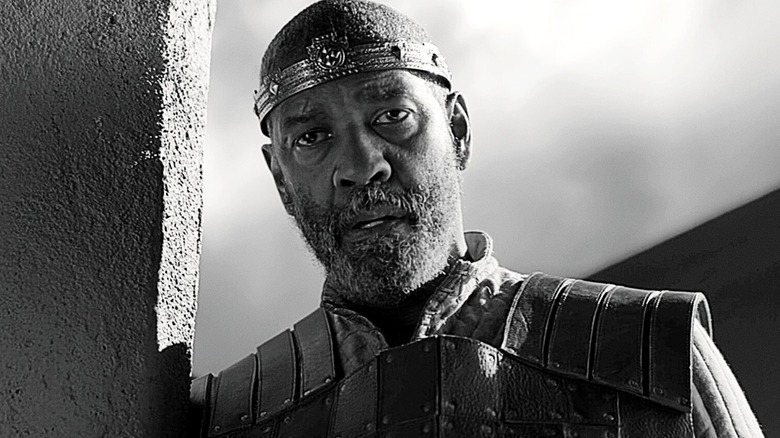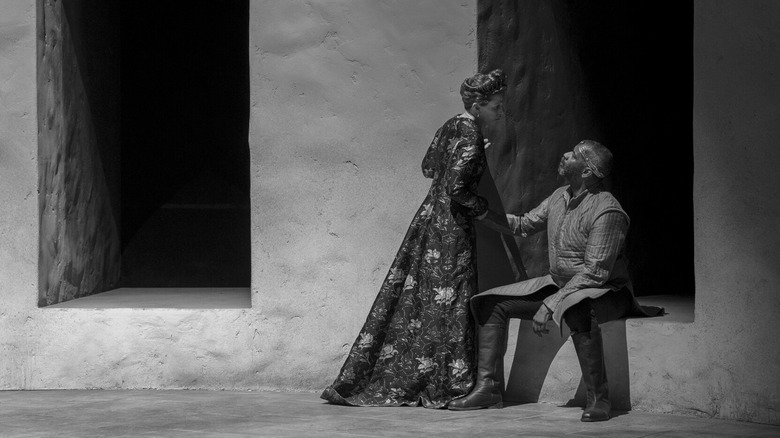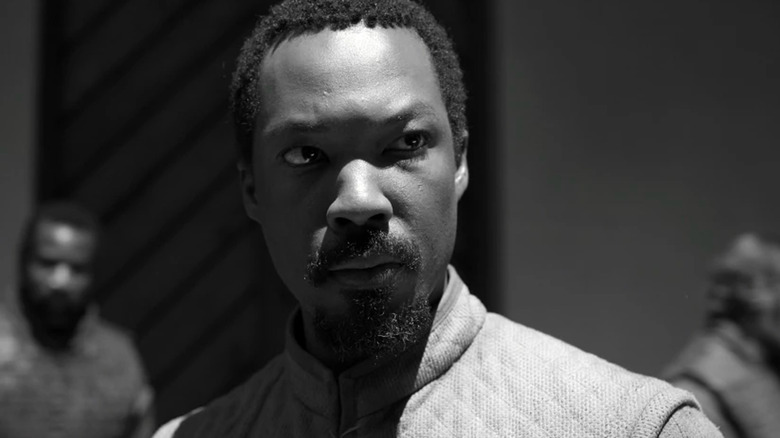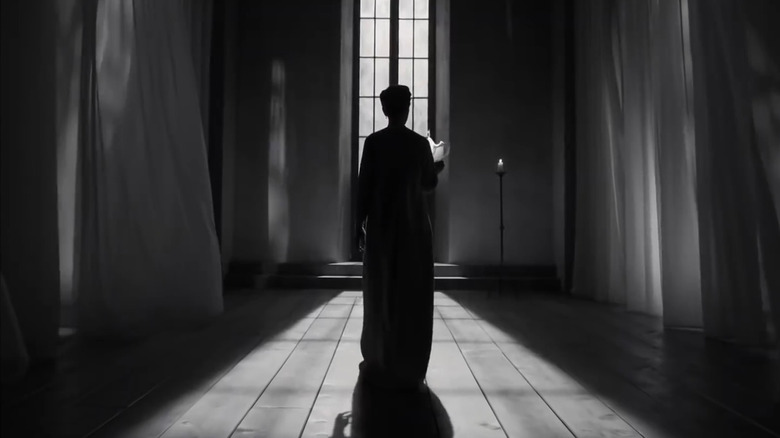The Tragedy Of Macbeth Is A Richer Film Thanks To Its Black Casting
Joel Coen's "Tragedy of Macbeth" may be the most diverse iteration of Shakespeare's Scottish Play to ever hit the big screen, but star Denzel Washington doesn't want audiences to focus only on race. "Obviously we are diverse," the actor told NBC BLK of the film's cast. "[But] we ought to be at a place where diversity shouldn't even be mentioned, like it's something special."
Washington has long been a champion for diversity in film — he famously sponsored Chadwick Boseman when the late actor was a student at Howard University. But he still maintains that Hollywood is more influenced by meritocracy than nepotism. In terms of how the "Tragedy of Macbeth" cast was selected, Washington explained: "These young kids — Black, white, blue, green or whatever — are highly talented and qualified. That's why they're here."
While that could very well be the case for Joel Coen's latest, the same can't be said for other Shakespearean adaptations — at least not on film. Washington is the first Black actor to portray the doomed thane in a major film adaptation. In fact, "Macbeth" hasn't been this unapologetically Black since 1936, when a then 20-year-old Orson Welles adapted the play for a production set in Haiti. Welles' "Voodoo Macbeth" inarguably walked so Denzel's own Macbeth could run, straight into the public consciousness with little to no mention of race.
Whether we like it or not, there is a "special" quality to "The Tragedy of Macbeth." It doesn't all rest on its diversity, but it's certainly a part of it — and it certainly merits discussion. Shakespeare's tragedy takes on an entirely new dimension because of its diverse cast. But was it all a conscious choice, or something the actors played up on their own?
Black Masculinity Takes Center Stage in Tragedy
Coen and co. have spoken at length about the theme of time in the director's "post-menopausal Macbeth." With Washington in the titular role, and Frances McDormand portraying his persuasive wife, the film diverts from the traditional interpretation of the text — that the Macbeths are young, hungry and teeming with potential — to focus on a maturing couple and their last opportunity to establish a legacy. Even as they seize their destiny and conspire to kill the king, time seems to be working against them.
But "The Tragedy of Macbeth" is also very much about gender: the correlation between masculinity and violence, and empathy in the opposite sex. Cruelty and ambition are exclusively masculine traits in the world of the story, and those expectations affect the Macbeths in unconventional ways. Macbeth strays from masculine expectations when his resolve to kill the king first wavers. It's Lady Macbeth who eventually goads him into regicide, but she has to insult his manhood to do it. This would put a strain on any couple's dynamic, but in the hands of Washington and McDormand, the Macbeths' relationship takes on an entirely new layer of subtext.
It's difficult to ignore the power imbalance — and the moral disparity — between a Black Macbeth and his white wife. Macbeth may be a formidable warrior, but Washington portrays him with the relaxed, uncle-like approachability that has endeared the actor to so many in his decades-long career. It makes his transition from unassuming thane to ruthless sovereign all the more surprising — but it also establishes him as something of a "non-threatening Black man." Black men, especially in America, often overcompensate for an "intimidating" nature by suppressing natural emotions like anger and frustration. They project a cool, unflappable image, often denying their aggression (or even their ambition) to minimize the threat they inherently present.
That Macbeth's desires are manipulated by other characters — namely his wife, whose ambition largely overshadows his own — could be a matter of coincidence. But when paired with Lady Macbeth's understanding of masculinity, an ulterior interpretation really starts to take shape. Lady Macbeth (like many other male characters in the text) conflates manhood with violence, even going so far as to "unsex" herself of all womanly virtue when planning Duncan's murder. Instead of weaponizing her femininity, Lady Macbeth disassociates from any part of it, and pressures Macbeth to do the same.
The Macduff of it All
This gives even more intention to Macduff's purpose as Macbeth's foil. Portrayed by Corey Hawkins, Macduff is the only other prominent Black character in Coen's film — and one of the few consistently-virtuous men in the text. He stands out for his ability to embody both "masculine" and "feminine" sensibilities. While Macbeth comes to rely solely on aggression to solve his problems, Macduff practices empathy and sensitivity where he can.
One pivotal scene allows Hawkins to render this perfectly. After Macbeth crosses the point of no return and murders Duncan, he continues to kill without discretion, even murdering Macduff's wife and children while Macduff is away. The news obviously comes as a shock, but Macduff's reaction to such sudden loss is something of a surprise in itself. Macduff allows himself to mourn and process his emotions in real time, even while surrounded by men who seem to lack this same inclination. One of his allies, Malcolm, suggests that he honor his family by retaliating swiftly: "Let's make us med'cines of our great revenge / To cure this deadly grief." He instructs Macduff to "dispute it like a man," to which Macduff firmly answers: "I must also feel it like a man."
Macduff is the last man standing with a healthy grasp of masculinity, and because of this he is qualified to take on Macbeth and win. He's technically the only person who can, according to the witches' prophecy: the Weird Sisters claim that no man born of a woman will ever harm Macbeth, and Macduff was born via cesarean section. But in many ways, that misleading omen is designed to distract Macbeth (and us) from what's really at stake: the end to a cycle of violence perpetuated by the culture of that time.
Just like Macbeth's relationship with his wife, the thane's dynamic with Macduff takes on different energy with a more diverse cast. That Macbeth and his most obvious foil are portrayed by Black men in disparate stages of life sets Coen's adaptation apart from so many we've seen in the past. Men in general are socialized to rely on aggression and avoid weakness at any cost, but Black men face even more pressure from society, even (or especially) by today's standards.
Macbeth, who has clearly spent years suppressing his sensitivity, eventually cracks under that pressure. Macduff hails from a younger generation, and as a result he has the tools to express his emotions in a healthier way. This perfectly mirrors the discussion around mental health and vulnerability in black men that Millenials and Gen Z have pushed to the fore, though not without the sacrifice of older generations. It's definitely too late for Macbeth, but in defeating him, Macduff also defeats the pervasive culture of toxic masculinity. (If only it were that simple in real life.)
How Much of This Was Conscious?
Is this something that Joel Coen and his cast consciously pursued? It's hard to know for sure based solely on Washington's comments. The actor brought up his own casting in a profile with Variety, while sharing one of the first conversations he had with Coen about the project. "Let's talk about the black and white of it all," Washington suggested. To that, Coen apparently replied, "Well, you're Black..." before he realized what Washington was really referring to: the director's choice to shoot the film in black and white.
Coen himself has made his fair share of remarks about diversity for diversity's sake. The director and his brother Ethan first came under scrutiny for the "overwhelming whiteness" of their 2016 film "Hail, Caesar!" — partly due to the #OscarsSoWhite controversy the year before. Joel Coen had strong objections to the issue, which he aired in a conversation with The Daily Beast:
"I don't understand [why people] would single out a particular movie and say, 'Why aren't there Black or Chinese or Martians in this movie?' ... You don't sit down and write a story and say, 'I'm going to write a story that involves four Black people, three Jews, and a dog,' — right? That's not how stories get written."
The Coens also spoke to the Washington Post about the lack of diversity behind the scenes. "You can only write what you can write," Joel remarked. "There should be more people involved in the process with more diverse backgrounds, so that what they write reflects a greater amount of diversity."
Ethan added, "That will be facilitated when people want to see those movies. But nobody wants to blame the public."
It's unfortunate (to say the absolute least) that Joel Coen would conflate representation for marginalized groups with representation for aliens or dogs. It may be worse that neither were aware of the genuine demand for films with inclusive casts — especially given the clamor for diversity in their own films. However, these remarks were taken in 2016, when many in Hollywood were still learning what it meant to be consciously inclusive. It's possible that they've changed their tune in the years since, and doubly possible that the success of "Tragedy of Macbeth" can help them see just how easy it is to employ colorblind casting.
Conscious or no, it's incredible to see Shakespeare take on new properties in the hands of those who rarely get the chance to interpret it. We're still very much at a point where a nonwhite Shakespearean protagonist is a novelty in Hollywood. Inclusive casts do, at least, dominate stage productions of the bard's most famous pieces, and it's about time those same efforts are brought to the silver screen with more frequency.



